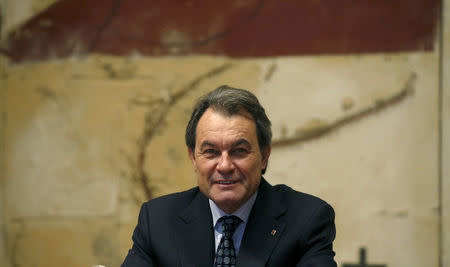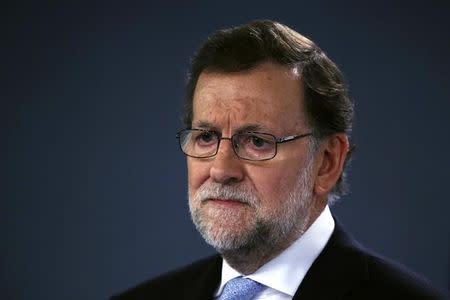Spanish PM sees new elections in Catalonia as inevitable
By Angus Berwick MADRID (Reuters) - Spain's acting Prime Minister Mariano Rajoy said on Tuesday that a new regional election in Catalonia was inevitable after its pro-independence bloc fractured over who would be the new government's leader. Catalonia has been unable to form a government since an election in September due to disagreements between the pro-independence parties who together gained a majority. If a new candidate is not chosen before Jan. 11, new regional elections will be called automatically, acting regional head Artur Mas told a news conference on Tuesday. The most likely date would be March 6, he said. The failure to form a Catalan government mirrors a political stalemate gripping all of Spain following an inconclusive national election on Dec. 20, and increases the likelihood all Spaniards will return to the ballot box this year. "I sincerely don't know what could possibly happen in the next five days, but I believe that the best that could happen is that Mas drops his independence drive and, as that doesn't seem possible, there's no alternative to elections," Rajoy said in a radio interview. Bond markets reacted positively to the bloc's division, with Catalonia's five-year bond yield falling to a three-week low on Tuesday, a few basis points away from is lowest level in around five months. "Short-term the disagreement is a positive as it delays any independence plans, and potentially pushes for new elections," said Alberto Gallo, head of global macro credit research at RBS. The prospect of new elections in Catalonia, which would be the fourth in less than six years, also increases the likelihood of a second national election this year. Rajoy's center-right People's Party, which had ruled Spain for the past four years, took the most seats but failed to win a majority in the 350-seat parliament in the Dec. 20 national election as voters angered by austerity measures and corruption scandals deserted it. The opposition Socialists, who have alternated in power with the PP since the restoration of democracy in the 1970s, also lost supporters in droves. Two new parties, the left-wing Podemos and the liberal Cuiadadanos, emerged to change the political landscape. The possibilities for resolving the national stalemate are a coalition government or a new election. But the receding threat of a strong Catalan government seeking a split from Spain reduces pressure on the PP and the Socialists to form a grand coalition to stand up to a separatist Catalan administration. Both parties strongly oppose a Catalan split from Spain and reject the holding of a referendum to decide the matter. The protracted efforts to choose a Catalan leader have, however, dampened a separatist movement that at its peak drew one million people onto the streets of Barcelona, and has highlighted divisions between supporters. On Sunday, a minority party in the regional coalition, CUP, said it would not support the business-friendly Mas in his bid for another term due to deep political differences over such issues as an independent Catalonia's membership of NATO and the European Union. Junts pel Si (Together for Yes), which pulled together the center-right CDC party and leftist ERC party to present a united pro-independence front for September's election, said it would stand by Mas, in power since 2010, as their candidate. A senior official of the CDC said on Monday the CUP had acted as an "ally of the Spanish state" in rejecting Mas. The leader of the ERC also said on Monday, without referring directly to Mas, that no one should resign. "There should be no talk of resigning, we must keep negotiating until the end," Oriol Junqueras said at a news conference. (Additional reporting by Paul Day and Sonya Dowsett in Madrid, and Dhara Ranasinghe and John Geddie in London; Editing by Angus MacSwan)





